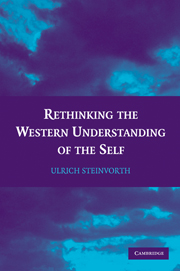Book contents
- Frontmatter
- Contents
- Preface
- Part I Introduction
- Part II Basics of Philosophical Psychology
- Part III The Cartesian Self in History
- Part IV Value Spheres
- Chapter 10 A First Diagnosis and Therapy for Modernity
- Chapter 11 Value Spheres Defined and the State
- Chapter 12 The Serving Spheres
- Chapter 13 Technology
- Chapter 14 Utilitarian or Cartesian Approach
- Chapter 15 The Media and the Professions
- Chapter 16 Science
- Chapter 17 Art and Religion
- Chapter 18 Sport
- Chapter 19 Latin and Absolute Love
- Part V A Self-Understanding Not Only for the West
- Select Bibliography
- Index
Chapter 10 - A First Diagnosis and Therapy for Modernity
Published online by Cambridge University Press: 05 June 2012
- Frontmatter
- Contents
- Preface
- Part I Introduction
- Part II Basics of Philosophical Psychology
- Part III The Cartesian Self in History
- Part IV Value Spheres
- Chapter 10 A First Diagnosis and Therapy for Modernity
- Chapter 11 Value Spheres Defined and the State
- Chapter 12 The Serving Spheres
- Chapter 13 Technology
- Chapter 14 Utilitarian or Cartesian Approach
- Chapter 15 The Media and the Professions
- Chapter 16 Science
- Chapter 17 Art and Religion
- Chapter 18 Sport
- Chapter 19 Latin and Absolute Love
- Part V A Self-Understanding Not Only for the West
- Select Bibliography
- Index
Summary
Let us look back at what we have discovered about the Cartesian self in history. The break between the childhood and the adult self finds a historical correspondence in the break between closed and open societies. Quite a few individuals develop an authentic self whether they live in a closed or open society (Greek philosophers and sophists are a splendid example). But it is only in an open society that the authentic self is recognized in institutionalized equal rights to decide on one's life. The break to modernity was motivated not by a desire to enhance happiness but by the desire of the individual to find a non-Sisyphean meaning of life. It took a religious form that imposed on everyone the duty to use their own judgment in their struggle for salvation and to respect everyone's judgment, transforming the ancient Greeks' pride in reason into a burdensome duty.
The new non-Sisyphean meaning was found in perfecting activities and brought forth the idea of sphere autonomy, yet this idea was only partially realized. Modernity suffers from lack not of a sphere-transcendent rationality but of a sphere of justice strong enough to adjudicate sphere conflicts and watch over equal liberty within the spheres. The disasters of the twentieth century demonstrate that today we do not only suffer from too weak a justice sphere but also from loss of understanding what the activities are that can give meaning to life.
- Type
- Chapter
- Information
- Rethinking the Western Understanding of the Self , pp. 97 - 100Publisher: Cambridge University PressPrint publication year: 2009

